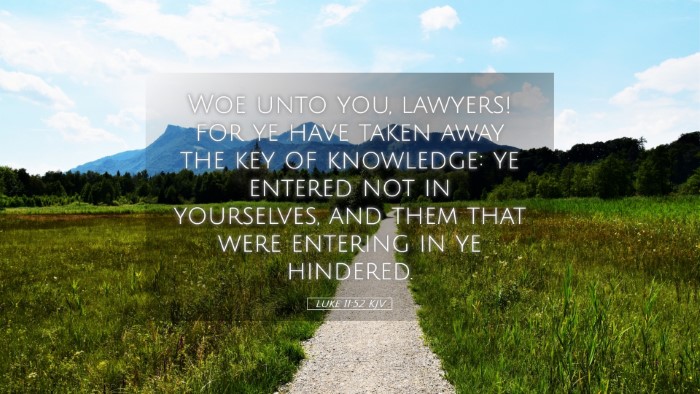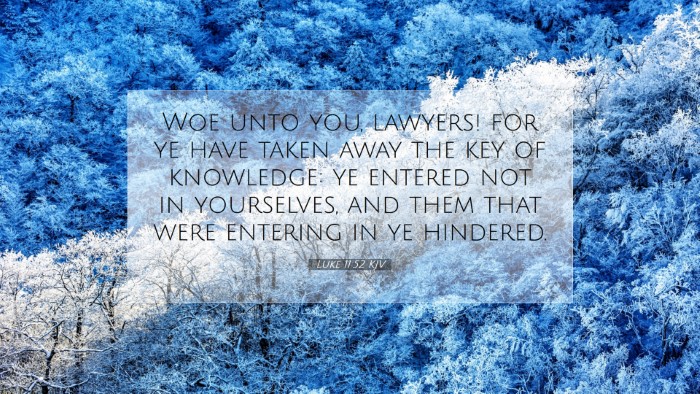Commentary on Luke 11:52
Luke 11:52 states: "Woe unto you, lawyers! for ye have taken away the key of knowledge: ye entered not in yourselves, and them that were entering in ye hindered."
Introduction
This verse is part of Christ’s denunciation of the religious leaders of His day, particularly the lawyers, who were supposed to be the custodians of the law. The verse encapsulates a profound critique of their role in spiritual guidance and knowledge dissemination. By analyzing this verse through the insights of public domain commentaries, we will explore the implications of Christ’s words and their relevance for contemporary believers, theologians, and church leaders.
Exegesis and Key Concepts
The term "lawyers" here refers to experts in the Mosaic law, who, instead of guiding the people towards a deeper understanding of God’s will, were misusing their authority. According to Matthew Henry’s Commentary, these lawyers had "taken away the key of knowledge," indicating their failure to open up the Scriptures for the people.
Adam Clarke elaborates on the phrase “key of knowledge,” interpreting it as that which opens the way to understanding the deeper truths of scripture. The lawyers were both withholding this key and preventing others from entering into the truth themselves.
The Implications of 'Woe'
Christ’s pronouncement of "woe" serves as a serious warning. As highlighted in Albert Barnes’ Notes on the Bible, this indicates the severity of their sin – the sin of willful ignorance and obstruction to the truth. The lawyers, in their pride and error, not only refused to accept the truth of God’s word but actively blocked others from access to this truth.
The 'Key of Knowledge'
The "key of knowledge" is a metaphor that represents the understanding and revelation of God’s Word. Matthew Henry suggests that this key is crucial for opening the treasures of wisdom found within Scripture. The lawyers, instead of sharing this key, locked it away due to their own spiritual blindness.
Clarke points out the irony; in seeking to uphold the law through their own tradition, they ended up becoming impediments to knowledge. This illustrates a larger principle that tradition can sometimes overshadow the divine intent of Scripture.
Reflections on Spiritual Authority
This condemnation highlights the responsibility that comes with spiritual leadership. Albert Barnes asserts that those in positions of authority must exercise their roles with humility and integrity, ensuring that the truth is accessible to all. The lawyers’ failure serves as a cautionary tale for contemporary leaders in the church.
It’s imperative that pastors, theologians, and teachers encourage open dialogue and promote understanding rather than building barriers. The essence of leadership is to serve and enlighten rather than to dominate and confuse.
Application for Today’s Church
The principles drawn from this passage maintain an enduring relevance. Here are some key applications for today’s believers:
- Encouraging Accessibility: Church leaders must strive to make biblical truth accessible to all, dispelling any notions that understanding Scripture is only for the elite.
- Promoting Discernment: Believers should be equipped to discern the truth for themselves, being encouraged to engage with Scripture actively.
- Rejecting Legalism: The danger of legalism and man-made traditions needs vigilant scrutiny; the focus ought to be on the transformative grace of the Gospel.
- Fostering a Humble Spirit: Leaders should embody humility, always recognizing that their role is to facilitate others’ encounters with God’s Word.
Conclusion
Luke 11:52 serves as a timeless reminder of the serious responsibilities borne by spiritual leaders. In a world where confusion abounds regarding biblical truth, the imperative to offer clarity and spiritual insight remains. As pastors, students, and theologians meditate on this verse, they are called to examine their roles as custodians of God’s wisdom, ensuring that they do not become obstacles but rather gateways to the understanding of the divine.


